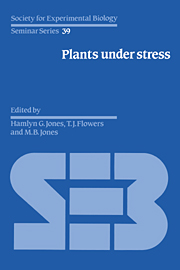Book contents
- Frontmatter
- Contents
- Contributors
- Preface
- 1 Introduction: some terminology and common mechanisms
- 2 The impact of environmental stresses on ecosystems
- 3 Whole-plant responses to stress in natural and agricultural systems
- 4 Photosynthesis and gas exchange
- 5 Regulation of growth and development of plants growing with a restricted supply of water
- 6 Stresses, membranes and cell walls
- 7 Desiccation injury, anhydrobiosis and survival
- 8 Molecular biology: application to studies of stress tolerance
- 9 Environmental control of gene expression and stress proteins in plants
- 10 Plant tissue and protoplast culture: applications to stress physiology and biochemistry
- 11 Breeding methods for drought resistance
- 12 Selection for physiological characters – examples from breeding for salt tolerance
- 13 Prospects for improving crop production in stressful environments
- Index
3 - Whole-plant responses to stress in natural and agricultural systems
Published online by Cambridge University Press: 16 March 2010
- Frontmatter
- Contents
- Contributors
- Preface
- 1 Introduction: some terminology and common mechanisms
- 2 The impact of environmental stresses on ecosystems
- 3 Whole-plant responses to stress in natural and agricultural systems
- 4 Photosynthesis and gas exchange
- 5 Regulation of growth and development of plants growing with a restricted supply of water
- 6 Stresses, membranes and cell walls
- 7 Desiccation injury, anhydrobiosis and survival
- 8 Molecular biology: application to studies of stress tolerance
- 9 Environmental control of gene expression and stress proteins in plants
- 10 Plant tissue and protoplast culture: applications to stress physiology and biochemistry
- 11 Breeding methods for drought resistance
- 12 Selection for physiological characters – examples from breeding for salt tolerance
- 13 Prospects for improving crop production in stressful environments
- Index
Summary
Introduction
The initial section of this chapter will briefly review three attempts to devise predictions of plant responses to stress. The first, Liebig's Law of the Minimum, originates from agricultural research and places strong emphasis upon the identity of the stress most severely limiting plant growth in each environment. The second derives from population biology and focuses upon the ways in which plants under stress differ from each other in demographic responses. The third approach (Plant Strategy Theory) attempts to bridge the gap between ecophysiology and population biology and recognises recurrent forms of ecological and evolutionary specialisation which are frequently associated with characteristic stress responses.
After describing some of the main implications of Plant Strategy Theory for the study of stress responses, brief accounts are provided of two additional dimensions of variation in plant response to stress; these consist of ‘stored growth’ and resistance to mechanical stress.
The search for a predictive model of plant responses to stress
Liebig's Law of the Minimum and its successors
The foundations of intensive modern agriculture and particularly the manipulation of soil nutrient supply owe much to the recognition by Liebig in 1840 that plant yield could be stimulated by recognising the identity of the resource most limiting upon dry-matter production at a given place and time. Since many plant types (e.g. hydrophytes, shade plants, legumes, calcicoles, calcifuges, metallophytes, halophytes) differ in resource requirements according to their evolutionary history, the principle was rapidly accepted in agriculture and in ecology that plant distributions over space and in time are often influenced by the differential responses of plants to variation in limiting resources.
- Type
- Chapter
- Information
- Plants under StressBiochemistry, Physiology and Ecology and their Application to Plant Improvement, pp. 31 - 46Publisher: Cambridge University PressPrint publication year: 1989
- 3
- Cited by



